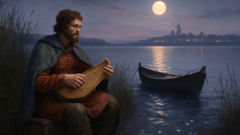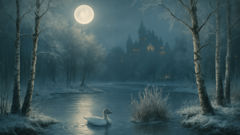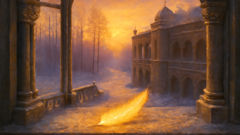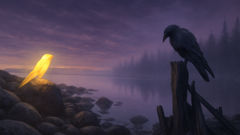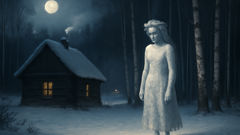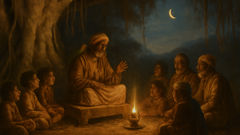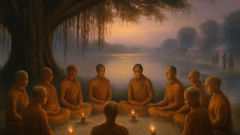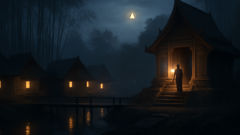Introduction
On the broad slow sweep of the Neva, where fog often pooled like a gray cloth across the water and gulls circled the masts of river barges, Sadko learned to listen. He listened to the city of Novgorod as if it were a single great instrument, its market cries and the creak of oars together shaping rhythms beneath his feet. Sadko was not born with a name that promised greatness; his family were modest merchants, and the gusli he coaxed music from had been passed through hands that knew the patterns of trade and the prayerful folds of winter. Yet his fingers found melodies that seemed older than any ledger, melodies that threaded through the market square and into the hush of taverns where sailors traded tall tales and wives folded linens. People said his music made coins glint brighter, and when he played on the Neva's banks at dusk—gazing out where the river met the gulf—fish leapt in patterns like punctuation, and men felt, for a moment, less burdened by cold or worry. That river, which fed Novgorod and carried its fortunes, also kept secrets. Beneath its surface the water moved with a mind not wholly given to the city above, and the sea that received the Neva was a place where currents spoke to currents and old sovereignties kept careful watch. It was there, amid reeds and rope and the low murmur of oars, that Sadko's melody slipped free of human ears and reached something that had listened in longer, in voices not made of breath but of tide. In time the townsfolk would tell stories: how a musician's song had opened an unseen door, how coins had come to his purse, how the Sea Tsar took him to a palace beneath the waves. But stories compress the slow and the subtle into decisive moments. In truth, Sadko's passage began like many things do—small, patient, and stitched with longing. He wanted to lift his family past the thinness of survival. He wanted his hands to be more than a tool for bread; he wanted his name to sound like the name of someone who had changed the fortune of his people. The river, the sea, and a strange luck answered in ways both generous and perilous, and the tune that had once been solace became the thread that would pull him into a world where music could move mountains of water and bargain with kings.
The Night the Water Listened
Sadko's fingers learned the gusli like a prayer: the thumb and forefinger plucked, the back of the hand steadying, the instrument's skin an echo chamber for longing. Word of his playing traveled along merchant trails, over frozen roads, and into the breathy rooms where sailors swapped omens. A wealthy merchant took a liking to him and said, with a wink and a purse held just open enough to glitter, that music and money might be made one. So Sadko shifted his hours, playing at the docks where ships were loaded and at feasts where captains boasted of northern seas. His songs became a craft, and the craft made him small fortunes enough to live on. But accumulation taught a new hunger. Coins, when amassed, became like notes repeated until they demanded variation; Sadko wanted more than the soft approval of neighbors. He wanted to feel the weight of coin as proof that music could transform fate.

One late autumn when the Neva's breath fogged the quay and ropes stiffened with rime, he played until the sky turned the color of old pewter. His melody had turned inward, not for applause but for something he could not name: a turning inward that felt like talking to a deep seam of the earth. The gulls had long since gone; only the slow slap of a barge against its berth kept time. Then a current shifted, not merely winds or tides but the feeling of the water itself. From where the river widened into the gulf there rose a movement of fins and lights, and the surface pulsed as if withheld breath were now released. A trough of luminescent blue traced the gusli's cadence and circled Sadko's feet. He did not leap away; though fear tightened the muscles in his throat, curiosity held his body in place. A voice came not through his ears but through the vibration under his soles—a sound like repeated chords translated into a thought. "Play," it said. "Play and we will listen. Play and we will speak in the only language we know."
He played. The melody lengthened into old shapes—tunes that might once have been sung by fishermen who prayed for nets that would not snap and by mothers who hummed for children born to frost. The water rose in a slow applause, forming a circle of glass that kept the shore away. When he finished, coins—bright coins he had never seen—bobbled to the surface and clustered at his feet. They were not the coins of Novgorod; their faces rippled like scales, and runes slid across their edges when the moonlight found them. A figure emerged from the gleamed waters: tall as a mast, crowned with barnacles that resembled an old iron diadem, his beard braided with kelp and pearls. The Sea Tsar's presence was less like royalty and more like the arrival of a season in full. He wore the slow contempt of tides and the patient hunger of deep things. "Sadko of the gusli," the voice said, both polite and inexorable, "you have learned a tune that bends water. I have listened for the sound of that melody longer than any winter. Because you have played, I will reward you for the song. Come to my house, and I will place riches at your feet. Stay if you will both tread the depths with me. Choose, and be sure, for the sea holds memory and a price."
Palace of Currents and the Bargain of Song
To walk beneath waves was to trade air for a history that moved like a slow train: memory, obligation, and the long arc of hunger. Sadko did not simply sink; the Sea Tsar's command wrapped him in a pressure that was gentle and absolute, an old magic that allowed breathless passage without breath. He crossed a threshold of light into a realm where columns of mother-of-pearl rose like birches from silt and where gardens of swaying weed were lit by fish that burned like cold lanterns. The palace itself was built of things found where worlds meet—anchor chains hung like curtains, fragments of ship hulls composed into mosaics that shone with the ghost of trade, and chandeliers strung with nets in which crabs had made homes. Merfolk moved like thought, not quite human, not quite fish: hands that remembered the feel of rope and of the gusli's polished wood, eyes that watched with the slow appraisal of creatures that judge by currents more than by speech.
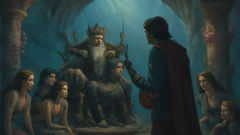
The Sea Tsar's court received Sadko as if he had been expected at once and not: there was formality, but the true audience was the sea. The Tsar's daughters circled him in gowns like drifting foam, and though they spoke in a tongue that bent consonants into the hush of waves, Sadko's music became their common speech. He played and the palace replied: tide-swirls tightened and loosened, pearls fell into shape like punctuation, and once a current arranged itself into a chorus that hummed beneath his strings. The Sea Tsar, who had watched empires rise and wreck on shoals, offered that ancient gift men trade with kings: riches and safety, power and the forgetting of earthly want. He promised sacks of foreign coin—gold stamped with unfamiliar crosses—gems that flashed like warm stars, and a house for Sadko in a preferred eddy, where the melody could be his forever. For all that, the Sea Tsar's eyes held an age-old patience. "You may take what you will, and you may remain, but know that the sea is not a generous smith; it tempers what it gives with what it takes. The music of men is new to deep things, and we will keep what we learn." Sadko, who had once wanted only enough coin to steady his mother's table, found his hands trembling with the shape of more terrible decisions. Wealth promised comfort and influence in Novgorod, but it also promised a tether to a world that did not breathe his name in the same way. The palace listened as much as it spoke, and on the palace's listening, his choice would take root.
For days—though days beneath waves are measured differently—Sadko played for the court. He learned that certain chords could settle storms and others could call a shoal close for inspection. He was given a chest of coins so heavy that when it was stacked on the palace floor the tiles sighed beneath it. Yet the freedom he had known on the riverbank, the smell of pine smoke and rye bread, of hands that greeted him without gilded ceremony, was not something the Sea Tsar could offer. There was, too, a quieter cost: each time he strummed a melody for the Tsar's amusement, something in him loosened from land. He began to dream in currents and to taste salt in fresh wishes, and small things slipped from his fingers as if grease of the deep clung there: the pattern of his mother's sewing, the pitch of a familiar prayer. He saw how easily music can be the key to an unfamiliar door and how easily a door once opened will close in ways you never meant.
Counsel came from unlikely corners. An old mariner who had traded with mermaids before carried tales of bargains that looked like mercy but wore habit as a mask. A small fish, bright as a coin, was said by the palace to visit Sadko in the hush between songs, and in its bright eye he read the simple truth that had been given to sailors for ages: the sea rewards those who listen and punishes those who forget where they began. One night, after endless playing and colder decision, Sadko dreamed of his village feast and of the warm tilt of his mother's head when he entered with sack and song. In that dream the gusli sounded not for opulence but for coming home. He realized that to be an instrument of the deep might win him riches beyond count, but to be severed from his roots would leave him a coin among coins—polished, valuable, and fundamentally alone. He sought the Sea Tsar then and asked, with fingers that had stopped shaking, for a path back to the surface and for a way to keep both the songs that had won him favor and the memory of home. The Sea Tsar considered the request the way tides consider weather, slow and inevitable. "Music travels both ways," the Tsar said. "There is a seam where the river remembers the shore. I will grant passage, but you must choose one offering to leave behind in my halls as a token: a vow, a thing of heart, or a thing of blood. In choosing, you bind the rest. Choose with the honesty a musician gives a note, and you will keep what you should. Choose ash and your home will remember you. Choose gold and your pulse will be silvered."
Conclusion
Sadko returned to the surface like someone who had been taught to breathe again. The passage was not a sudden wrench but a measured settlement: the palace let him go with a gift and with loss, and the coins he brought back gleamed with the knowledge that the sea had weighed them. Novgorod met him with the same wind and the same cobbles, but Sadko returned different, a man who had seen how music could shape tide and bargain with kings yet also cause quiet things to loosen. He kept some treasures and left some vows beneath the waves as the Sea Tsar demanded—tokens that were both ransom and assurance. He used what wealth he carried not simply to buy better clothes or a larger house but to reweave the community that had once taught him tone and kindness: he mended nets with fishermen who had lost sons to winter, paid for bread in a famine, and taught the gusli in the tavern loft where young hands learned to turn their wants into melody. In time his name settled into stories told at hearths—tales embroidered with wonder and warning. Parents would hum his melodies to hush squalling infants, and sailors would tap the side of their boots in rhythms they said the deep recognized. For Sadko himself, the lesson remained simple and stern: art can summon marvels and wealth, but the truest songs are those that remember where they began. He held to both worlds as best any man can, playing for merchants and for mariners, keeping his fingers both on strings and on the fragile thread that binds a person to home. In the end, his story changed little in the telling of it—coins glimmered, a palace hid in waves, the Sea Tsar listened and negotiated—yet its meaning bent toward a quieter truth. A musician does not merely gather riches; he gathers attention, and that attention will always ask for an account. Sadko’s account was simple: that he would use his gifts to tend his people, keep old songs alive, and never let the music of the deep drown out the human voices that sang by the hearth.

